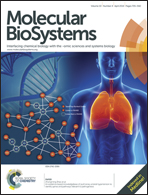Fluctuation of multiple metabolic pathways is required for Escherichia coli in response to chlortetracycline stress†
Abstract
Bacterial antibiotic resistance has become a worldwide challenge with the overuse and misuse of drugs. Several mechanisms for the resistance are revealed, but information regarding the bacterial global response to antibiotics is largely absent. In this study, we characterized the differential proteome of Escherichia coli K12 BW25113 in response to chlortetracycline stress using isobaric tags for relative and absolute quantitation labeling quantitative proteomics technology. A total of 723 proteins including 10 763 peptides were identified with 184 decreasing and 147 increasing in abundance by liquid chromatography matrix assisted laser desorption ionization mass spectrometry. Most interestingly, crucial metabolic pathways such as the tricarboxylic acid cycle, pyruvate metabolism and glycolysis/gluconeogenesis sharply fluctuated, while the ribosome protein complexes contributing to the translation process were generally elevated in chlortetracycline stress, which is known for a compensative tactic due to the action of chlortetracycline on the ribosome. Further antimicrobial susceptibility assays validated the role of differential proteins in metabolic pathways using genetically modified mutants of gene deletion of these differential proteins. Our study demonstrated that the down-regulation of metabolic pathways was a part of the global response and played an important role in the antibiotics resistance. These results indicate that reverting of these fluctuated pathways may become a novel strategy to combat antibiotic-resistant bacteria.


 Please wait while we load your content...
Please wait while we load your content...